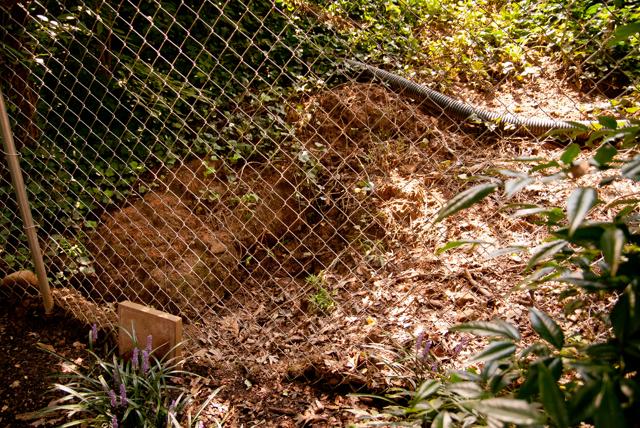The gray sludge arrived at the beginning of March. By the first day of spring, it had grown into an amorphous puddle, slowly surfacing along the fence line of Vickie Bradley‘s east Asheville home. It quietly killed off the cyclamen she’d planted years ago but had yet to see in full bloom. This was the year she hoped her hard work in the dirt would finally produce the pink petals that always reminded her of butterflies. (photos by Max Cooper)
At first, Bradley just shrugged and hoped for the best. The puddle didn’t seem significant, she reasoned; it would probably be gone in a week. Instead it grew, claiming a 4-by-6 portion of her backyard. One sniff revealed that the mysterious, murky gunk was human sewage. ‘It smelled putrid,’ she recalls. ‘It was this very foul-smelling gray discharge.’
Bradley hired a plumber to identify the source of the leak. Those efforts proved futile, but a conversation with a neighbor yielded a clue: Another neighbor had recently had problems with his sewage line.
Wondering whether her neighbor’s sewage was somehow making its way to her yard, Bradley called the Metropolitan Sewerage District. Her hunch was confirmed when, one dye test later, the gray sludge briefly turned blue. MSD estimated that a plumber would charge about $7,000 to fix the problem and install a new pump. But as week after week passed with no sign of progress, a frustrated Bradley says she contacted nine different agencies in an effort to expedite the repair process or put pressure on her neighbor.
Three agencies deal with local sewage issues: MSD, the Asheville office of the state’s Division of Water Quality and the Buncombe County Health Department. And not one of them is necessarily empowered to either repair this kind of problem or force a solution.
No jurisdiction
Although MSD can administer a free dye test, it’s not authorized to repair a sewer line it neither owns nor maintains. As Director of System Services Ken Stines explains, the agency’s jurisdiction ends where a private line begins.
‘We can work on our main lines, and we’ll work 10 feet off of our main lines – what we call a prescriptive easement – to give us the right to maintain and work on our system,’ he explains. ‘But we cannot work on lines that run behind houses, and we cannot work on private property.’
The sole exception, says Stines, is MSD’s Unclaimed Sewer Rehabilitation Program, which addresses situations posing a direct threat to public health and welfare. But it has its own eligibility rules, approved by the MSD board.
‘There has to be more than one house tied onto a line, which in this case there’s not,’ he explains. (Bradley’s problem was that she lives downhill from the neighbor.) ‘And it has to be a health hazard, which it is.’
Environmental Health Director Marc Fowler concurs. ‘What we’re talking about is a huge laundry list of bacteria, viruses, parasites and, in some cases, even fungal infections,’ he explains. ‘Everything from E. coli to viruses to parasitic infections like cryptosporidium.’
Between January and June, MSD received calls about three other such leaks, Stines reports. Usually they’re due to aging pipes that the homeowner either can’t or won’t pay to get fixed.
It’s not that MSD doesn’t want to help, stresses Stines. ‘We would do it if we had the power, but there’s nothing that says we can,’ he laments, adding that the Division of Water Quality used to handle these issues.
Where’s the water?
Like many state agencies, the Asheville office has faced budget cuts, and a smaller staff has meant narrowing the scope of services, says Chuck Cranford, surface water protection supervisor. Among the three staffers lost in June was the one who painstakingly researched such problems.
‘There’s no map of these private collection systems: We don’t know what houses they’re coming out of, or where they go, or whose they are,’ says Cranford. ‘So they’re very complicated to try and figure out who’s the responsible agency to go into that leak.’ He says his office typically receives at least one phone call a week about a similar issue.
A state statute allows his agency to step in if the sewage is entering waters over which the state has jurisdiction: rivers, streams, lakes, etc. In Bradley’s case, however, the sewage was on solid ground.

‘We’re a Division of Water Quality,’ notes Cranford. ‘So if there’s wastewater sitting on the land’s surface and it’s not getting into waters of the state, then we’re kind of limited in what we can do.’
The agency can issue a notice of violation if someone fails to get a permit or honor its terms. But when it comes to enforcement, ‘We’re just very limited with our tools here,’ says Cranford.
The paper chase
The third agency, the Health Department, deals primarily with septic tanks, not MSD’S system. In any case, the department focuses more on permitting, inspecting and approving septic systems than on repairs.
‘We don’t have an engineering section that can go out and dig in someone’s yard and replace the sewage line for them,’ Fowler explains.
Still, ‘If raw sewage is observed on the surface of the ground, Environmental Health can investigate or direct individuals to the appropriate agency,’ notes Health Director Gibbie Harris. In Bradley’s case, however, there didn’t seem to be one.
Possible solutions
Bradley’s problem finally got resolved in early July after her neighbor called someone to come fix the leak.

Meanwhile, staffers from the three local agencies are putting their heads together to consider ways to cut through the bureaucratic tangle and beef up enforcement capabilities so people who find themselves in Bradley’s situation won’t have to wait months for their neighbor to repair a faulty sewage system.
‘We just really want to make sure everybody’s on the same page and understands whose jurisdiction it is, and who we need to call when we have those issues,’ Stines reports.
Other Tar Heel counties have found solutions to simliar challenges, notes Stanley Boyd, MSD’s director of engineering services. In 2004, he notes, Mecklenburg County’s Board of Commissioners adopted an ordinance giving the local water-quality agency more enforcement powers. Although the circumstances aren’t identical, says Boyd, ‘The situations are somewhat similar. There was no one who could actually claim responsibility and deal with the issue.’
One idea the three agencies here have talked about, he continues, is establishing a financial-assistance program so people could set up a payment plan for sewage-repair costs.
‘We’re not just looking for a hammer – we’re looking for a solution,’ says Boyd.
(photos by Max Cooper)
Caitlin Byrd can be reached at cbyrd@mountainx.com, or at 251-1333, ext. 140.



Before you comment
The comments section is here to provide a platform for civil dialogue on the issues we face together as a local community. Xpress is committed to offering this platform for all voices, but when the tone of the discussion gets nasty or strays off topic, we believe many people choose not to participate. Xpress editors are determined to moderate comments to ensure a constructive interchange is maintained. All comments judged not to be in keeping with the spirit of civil discourse will be removed and repeat violators will be banned. See here for our terms of service. Thank you for being part of this effort to promote respectful discussion.